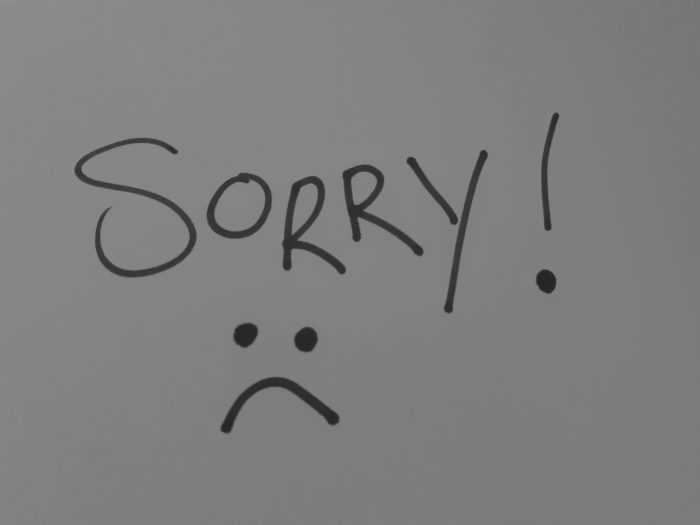We Brits are masters of saying sorry. Apparently we apologize, on average, eight times a day. We often say it when we don’t really need to. It’s one of the most over-used words in our vocabulary and is a knee-jerk reaction to almost any circumstance. We use it as a form of ‘negative politeness’ so we appear well-mannered and modest.
We use it when we ask for something: “I’m sorry but could we get the bill please?”
We use it to help us in embarrassing situations: “Sorry! Think that was me. Last night’s curry. Sorry again.”
We use it when we bump into someone: “Oh sorry! I didn’t see you there.”
We use it when they bump into us: “Sorry! Ooops you didn’t see me there did you mate.”
We use it to be polite: “I’m sorry to bother you, but is anyone sitting here?”
We use it when we call someone on the phone: “Sorry to call you so late! I know Corrie is about to start...”
We use it when someone calls us and it’s their mistake: “Sorry, but I think you have the wrong number.”
We use it when we are late: “Traffic was awful. Sorry I’m late.”
And when we are early: “Sorry I’m a little early. Roads were clear.”
We use it to express sympathy: “I’m so so sorry to hear about your brother.”
We use it when we mishear something: “Sorry?”
We use it to interject. “Sorry, can I just butt in there.”
We use it when we hand over a large note to pay for a cup of coffee. “Sorry, it’s all I have.”
We use it to express delight: “Oh wow, exciting! Sorry I can’t stop smiling.”
We use it to express surprise: “ARGHHHH Jeez. Sorry! You startled me!”
We use it ALL the time.
So why do we struggle using this word for the purpose it was cultivated for?
We were taught as kids to apologize to our siblings, friends or parents if we were mean or hurtful or upset someone. An apology is the basic reaction to any childhood misbehavior.
“Yeah I’m like sorry I flushed your doll down the toilet…”
Even if we begrudgingly said it. Often with a smirk if mother wasn’t looking. And with our fingers crossed behind our back so only your sister could see. And then whispered “I’m not really, cos you started it” in her ear as you sauntered by her bedroom minutes later.
It’s only years later we understand the concept of apologizing in its truest form, and how it is interwoven with elements of self-recognition, human pride, self-righteousness and that inner battle of not appearing submissive or vulnerable.
But why do some consider apologizing as a sign of weakness? Surely, it’s a positive quality rather than a negative. It should reaffirm shared values. It should suggest self-awareness, maturity and humility. Demonstrating emotional vulnerability is not a bad thing even if it is painful or difficult at times.
Enter stage right: Pride. Stubbornness. Arrogance. Disrespect. And our old friend Ego.
We, as humans like to defend our positive self-image. An apology can sometimes feel like an admission that we are inadequate. We don’t want to apologize because we don’t want to feel bad about ourselves or appear flawed. But nobody is perfect. And we all try to flush our sister’s Barbie doll down the toilet at some stage of our lives.
An apology is one of the most important principles in life. It’s the epoxy glue in a kitchen of broken plates. It can sort a hairline crack or possibly something smashed into smithereens. The plate might not be as sturdy or robust as before. It won’t hold a chicken dinner. But it might sustain the weight of a pork pie.
The world apology comes from the Greek roots of apo and logia (meaning ‘speaking in defence’). It was used initially to indicate a justification or defense of a belief or an idea. The word apology began to mean ‘I’m Sorry’ around the end of the 16th century and its origin is attributed mostly to the works of Shakespeare and stems from the Old English word sorh or sorg (sorrow).
“My lord, there needs no such apology. I do beseech your Grace pardon me”
Richard III
An apology creates balance and can restore trust. It can help heal a wrong and help make things right. It means someone has understood their wrong-doing and has the ability to look at themselves and admit their mistake and make an effort to make amends. It is how we express regret or remorse for our actions.
The aim is to seek forgiveness to reconcile and restore a relationship. The ‘when’ and ‘how’ the apology is offered can affect the outcome of the forgiveness. For most misdemeanors those two words, backed with genuine remorse and a hug is often all that is required and will beat a bunch of flowers or a box of Milk Tray hands down. (although never underestimate the power of chocolate). More severe transgressions might require a little more effort and a genuine hard look at your actions. Some sins may be simply unforgiveable.
But it starts here, with an olive branch and whatever words you choose: I apologize – I’m sorry – It was my fault – Please forgive me – I fucked up. A sad faced emoji might be a start. Even My Bad is better than nothing (if you’re 12). Because without an apology there is no forgiveness. Without forgiveness there is conflict. With conflict there is no truce. And as a community and a nation we need peace and reconciliation.
Saying sorry may mean the plate will still never, ever return to its former glory. But in life nothing ever retains its pristine brand-new spotless condition. I’m sorry to say, we are all a little cracked and broken and mostly held together with super glue.







Read 0 comments and reply